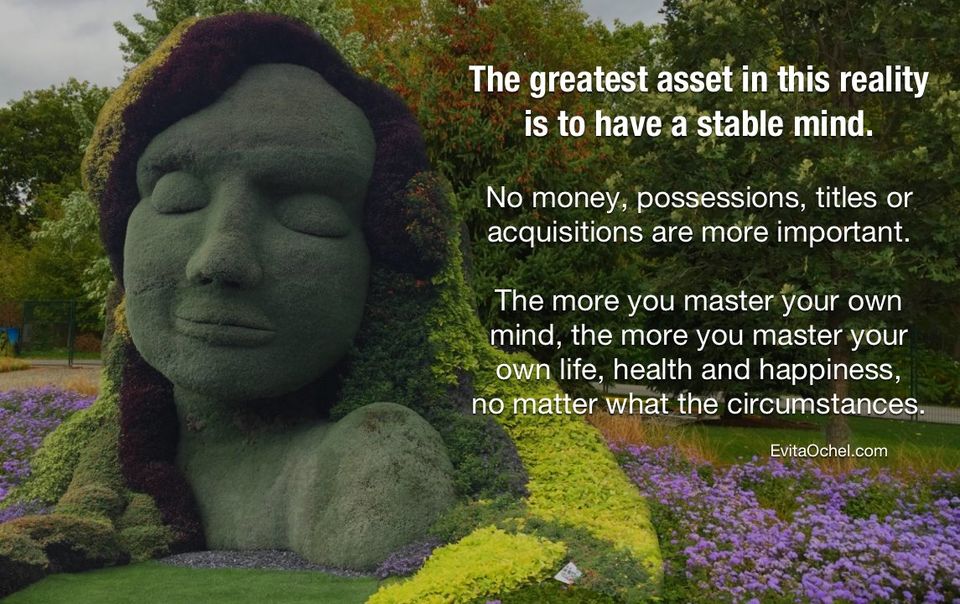The greatest asset in this reality is to have a stable mind. No money, possessions, titles, or acquisitions are more important. The more you master your own mind, the more you master your own life, health, and happiness, no matter what the circumstances.
Whether you want to turn your life around, or make some simple changes, or overcome the suffering, stress, and challenges that are commonly associated with this life experience, the gateway is your own mind.
What you know, the thoughts you think, the opinions you have, the choices you make, and the actions you take all largely depend on who is manipulating your mind. From Facebook and Twitter to Google and Amazon, and every marketing expression in between, all of these forces are competing for your mind. A comprehensive explanation of this is provided in the article: Invisible Manipulators of Your Mind.
Here is a quote from that article that really stands out:
The behavioral techniques that are being employed by governments and private corporations do not appeal to our reason; they do not seek to persuade us consciously with information and argument. Rather, these techniques change behavior by appealing to our nonrational motivations, our emotional triggers, and unconscious biases.
Tamsin Shaw - Invisible Manipulators of Your Mind
How to Create a Stable Mind
The general foundation on which to focus to create a stable mind is based on five areas. Upon applying these in our life, we are then further guided, step by step, to know what requires our attention to specifically meet and overcome our own unique limiting beliefs, wounds, and challenges that continually de-stabilize our mind.
1. Nutrition
Nutrition is an absolute must here, as the food we eat either supports our entire system or hinders and disrupts its normal and optimal functions. While important to consider too, it goes way beyond any nutrients or chemicals found in foods, right down to the energetic frequency of every single substance and how it influences our / our mind’s energy field and potential. There is a reason why ancient (and modern) yogis, monks, and anyone serious about harnessing their mental power typically focus on eating small amounts of food, light foods (from plants), high energy foods (more raw foods), and do regular fasting.
2. Meditation
Doing any meditation is a good step in the right direction and a great place to start. However, the more we go down this path, to train, understand and master our mind, the more we benefit from something more structured like Vipassana meditation or the yoga path of mediation, which both outline how to access the deepest parts of ourselves.
3. Mindfulness
Living with and in a state of general mindfulness is important here too, as we need to be aware of how we think and why we think, what we do and why, what we feel and why, etc. The more space there is between thoughts, the less reactivity, and the more we are empowered to make effective choices and responses in any given moment, which ultimately makes all the difference to our lives, as it changes the outcomes accordingly.
4. External Guidance
While we can discover everything we need from within, for most people in our world today, it will be very helpful to be nudged into our inherent knowledge about the elusive and impermanent nature of this reality and our consciousness’ timelessness by immersing ourselves into content that focuses on the grounded wisdom and philosophies of our spiritual existence. This does not refer to most of the modern new age and spirituality distractions that are abundant today. We are talking here about spiritual integrity and timeless wisdom, like Lao Tzu, the Vedas, Patanjali, and many other ancient and modern teachers. The key thing to look for in quality guidance is content that touches on Universal Truths, which have a simplicity that applies to everyone at their core, as opposed to temporary, subjective, convenient, or trendy “truths” that try to differentiate themselves. The more complications, rules, rituals and regimens, the less likely it is to have any substantial value for us.
5. Nature
Finally, nature, and immersing oneself into the natural world deeply is an essential part of creating a stable mind. This alone can help us learn about ourselves, learn about the nature of reality, and stabilize our minds.
Conclusion
The most significant part of this life journey revolves around learning about the nature of our mind while living from the heart. The more you realize that you are not the mind and the more you get to know how your mind works, and how to have the mind and heart work together in a state of coherence, the more your state of being, wellbeing, and life reflect joy, harmony, and peace.
Therefore, through the practices of observation, reflection, stillness, silence, meditation, awareness, and mindfulness, we are guided to live from a state of expanded consciousness about the thoughts, words, and actions we choose, in any given moment.
Ultimately we need to understand that creating a strong, balanced, grounded, and stable mind is a lifelong process and requires our daily focus, effort, and commitment.

